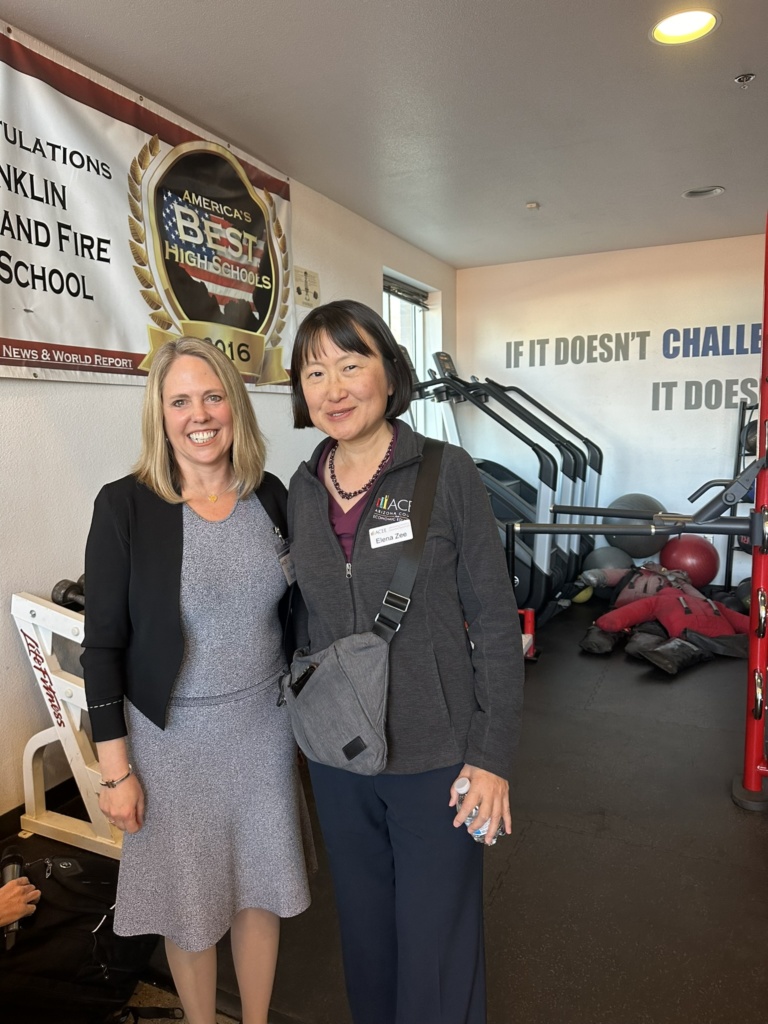While March is Women’s History Month, Mary L. Rigdon, Freedom Center Director and Associate Professor of Political Economy and Moral Science, has dedicated her career and scholarship to helping shape a brighter future. Her work and its importance to women worldwide was recently featured on ABC15 Arizona in an exclusive interview with Anchor Nick Ciletti, a seven-time Emmy award-winning journalist.
“Pushing for change when it comes to women in the business field: that’s the goal of an Arizona professor and researcher who has made it her mission to educate not just her students but also the world about the challenges that still exist for so many women,” Ciletti said.
The feature aired on Monday, March 18, and details Mary’s passion and motivation to make an impact that creates more and better opportunities for women in the C-Suite and throughout the workforce. It reflects her research illustrating that competitiveness is a function of motivation, addresses the underrepresentation of women in finance, and highlights the gender wage gap between white, Asian, Black, and Hispanic women.
Mary asserts that organizations, not women, must change.
“It’s about changing the systems in which we operate. There are ways that organizations can attract competitive women, but we need to think strategically about what those mechanisms look like instead of telling women to lean in or be more assertive for which,” she says. “We as a society are paying costs associated with the racial pay gap.”
About Mary’s Research: Understanding Competitiveness and the Gender Wage Gap
Mary’s research, funded by the National Science Foundation and pursued with Alessandra Cassar, Professor of Economics at the University of San Francisco, provides a deeper understanding of gender competitiveness while discovering new questions and opportunities for future exploration.
Contrary to conventional wisdom, Mary and Alessandra hypothesized that women are just as competitive as men but motivated differently. To test this, they created a labor market in the laboratory to measure gender competitiveness in two different scenarios: one providing winner-take-all incentives versus an alternative incentive scheme with an option for the winner to share their winnings with one of the low performers in the competition.
Their results were published in the prestigious Proceedings of the National Academy of Sciences. Men were more competitive than women with a winner-take-all incentive scheme, replicating previous results. Strikingly, the competitiveness gap was eliminated when there was an option to share winnings with one of the low performers following the competition. In this scenario, women nearly doubled their rate of competitiveness, resulting in the gap in competitiveness between men and women being eliminated. The even more surprising twist: women were motivated to compete by having the option to share, they did not really exercise the option to share. This is an area where future research is needed to better understand why social incentives motivate women to compete.
Mary and Alessandra also examined biological and cultural factors that could impact gender competitiveness. Their subsequent analysis was published in a special issue of Philosophical Transactions of the Royal Society B (Biological Sciences). They asserted that women are differentially sensitive to social aspects that are context-specific. Competitiveness in women reflects personal and societal pressures in such a way that the desire to compete for resources is intertwined with concerns about the distribution of those resources. This groundbreaking research is advancing the wage gap conversation from how to change women’s behavior – lean in, be assertive – to ways institutions and incentives should change to promote women’s natural competitiveness. Leveraging social incentives to develop recruitment, compensation, and reward strategies can have a meaningful impact. Organizations with a strong social mission that provide inclusive incentive structures like team bonuses and employment contracts that include benefits for children like paid parental leave, school vouchers, and flexible work schedules have a better chance to engage talented professionals who are great leaders and deliver results.
Impact Partnerships: Arizona Council on Economic Education
The Freedom Center has forged a strong partnership with the Arizona Council on Economic Education, under the leadership of their President and CEO, Elena Zee, to help encourage young women to pursue careers in finance. The Center was a signature sponsor or the ACEE’s Invest in Girls Exploring Finance Program; Mary gave an inspirational and educational keynote speech, “Women Rising, Understanding Competitiveness and the Gender Wage Gap.”
ABC15 Arizona’s Nick Ciletti also recently profiled the Invest in Girls program, including an interview with Elena in a feature called, Arizona Council on Economic Education is making it make “cents” for Valley girls (Watch).
Mary’s Upcoming Keynotes
-
- March 27 – Arizona Department of Economic Security, Women’s History Month speaker series, “Women Who Advocate for Equity, Diversity, and Inclusion.”
Learn More
Mary’s research has been cited by the World Economic Forum as one of fifteen strategies helping to close the gender wage gap around the world, and national and international media have covered it. She was a featured speaker at the 2023 UArizona Wonder House at SXSW.
Read more about this research:
-
- Prosocial Option Increases Women’s Entry into Competition (A. Cassar and M.L. Rigdon) – Proceedings of the National Academy of Sciences, 11/1/2021; https://doi.org/10.1073/pnas.2111943118
-
- Option to Cooperate Increases Women’s Competitiveness and Closes the Gender Gap (A. Cassar and M.L. Rigdon) – Evolution and Human Behavior, 42(6): 556-572; https://doi.org/10.1016/j.evolhumbehav.2021.06.001
-
- Sustaining the Potential for Cooperation as Female Competitive Strategy (A. Cassar and M.L. Rigdon) – Philosophical Transactions of the Royal Society B, for a special issue on cooperation among women (information on all the articles) 378:20210440; https://doi.org/10.1098/rstb.2021.0440



